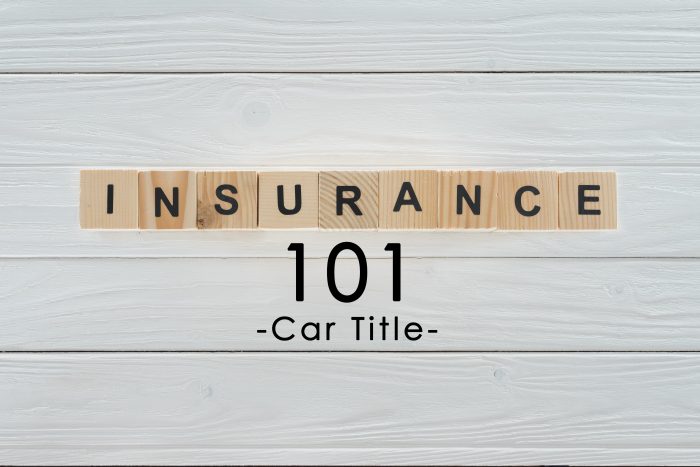Term of the Day: Car Title

A piece of paper can have so much value. Money, social security cards, marriage certificates. The title for your vehicle also holds significant value–it provides proof of ownership for your vehicle. Have you ever thought about the reason why car titles are so important?
What is the overall purpose of a car title?
As mentioned before, “the certificate of title is a legal document that indicates the legal owner of the vehicle.” The title is typically issued by your Department of Motor Vehicles. When you sell your car, the title will be transferred over to the new buyer, which is then used to register the car in the buyer’s name. A title is also important when buying a car because it mentions basic information about the car’s history, depending on the kind of title the vehicle has.
What information is included in the car title?
Information about the owner including:
- Name
- Address
- Year, make, model, and vin number of the car
- The date which the car was sold
What are the different types of car titles?
Every vehicle begins its life with a “clean title.” If an incident occurs during its life, the insurance company records the event and files for a change in title. As a result, there are multiple types of titles (the name for each title depends on the state.) In general, the following titles are recognized by each state.
Clean title: A clean title is ideal when searching for a car. This type of title indicates that the vehicle has never been declared a “total loss,” or been in a serious accident. If the vehicle has been in a minor accident, it will still have a clean title. A car with a clean title is often likely to have a longer lifespan.
Clear title: Although clear title sounds similar to clean title, they are entirely different things. A clear title states that there is not a lien on the vehicle. The owner having a clear title indicates that they have sole ownership on the vehicle without any creditors or third parties being involved.
Salvage title: After the car is involved in a disastrous event, such as a car accident, fire, or flood, the insurance company can decide to “total out” the vehicle. This happens when the cost to repair the vehicle exceeds the current value of the vehicle. If the vehicle has a salvage title, it’s going to be cheaper. However, it can be more susceptible to mechanical issues and be more difficult to insure.
Reconstructed title: When a salvaged car is rebuilt, the state will inspect the vehicle to ensure the repairs are satisfactory before it can be issued a “rebuilt/reconstructed title”. There is a red flag for reconstructed titles as well, as they may be more difficult to insure.
Car titles are evolving along with technology. Check back in tomorrow to learn more about what’s changed with car titles.
Do you have questions about your insurance? Find an insurance agent near you with our Agent Finder
Search All Blogs
Search All Blogs
Read More Insurance Blogs
A Presidential Legacy: Using Life Insurance to Fund Your Charitable Vision
What will your legacy be? Learn how to use life insurance to make a significant charitable impact this Presidents’ Day without depleting your current savings.
A Gift Beyond Roses: Why Life Insurance is the Ultimate Expression of Valentine’s Day Love
Roses fade, but financial security lasts. Discover why life insurance is the most selfless Valentine’s Day gift you can give your family this year.
T-Minus 30 Days: The Late January Review of Beneficiaries and Tax Implications
Tax forms are here. Review your life insurance beneficiaries one last time, and understand the tax status of policy payouts vs. accrued interest.
The Mid-January Check-Up: Why Scheduling Your Life Insurance Exam Now Locks in the Best Rate
Don’t delay the exam! Schedule your Life Insurance paramedical exam in mid-January to lock in your best rate and complete your application process quickly.
Tax Season Lifeline: Why January is the Time to Secure Estate Liquidity with Life Insurance
Tax season is here. Use Life Insurance to create tax-free liquidity for your estate and protect your family business from forced asset sales.
The Healthy Policy: Leveraging Your January Wellness Resolutions for Life Insurance Savings
Did you resolve to get healthier? Your improved fitness can translate into lower life insurance premiums in the new year.
The Family Legacy: Why December is the Time to Name a Trust as Your Life Insurance Beneficiary
Protect your payout. Discover the benefits of naming a Trust as the beneficiary of your life insurance to control distributions and minimize probate delays.
The Most Sustainable Gift: Life Insurance and the Value of Income Continuation Planning
Life insurance ensures the Christmas cheer continues. Practical tips on using income continuation math to calculate the right term policy size for your family.
The Ultimate December Gift: Why Life Insurance is the Most Important Present You’ll Ever Give
Forget the gadgets; life insurance is the real gift of security. A timely look at protecting your family’s future during the season of giving.
The Modern Parent’s Dilemma: Life Insurance for a Generation of Savers and Investors
Today’s parents have new financial goals. Here’s how life insurance can be a flexible tool for a modern family in 2026.










